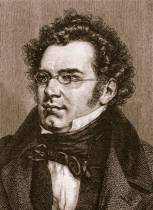
THE UNFINISHED SYMPHONY
FRANZ
PETER SCHUBERT was born in the little village of Lichtenthal, near Vienna, on
January 31st, 1797. Of all the great
artists the world has known, he was perhaps the most luckless. Miserably poor, extremely ugly in physical
appearance, his finest compositions utterly disregarded during his lifetime,
his existence was more sad and weary than is usually the fate decreed for
genius. He was never able to hear even
an orchestral rehearsal of his two greatest symphonies, that in C and his
symphony in B Minor, popularly known as The Unfinished Symphony. Contrary
to the common belief, the Unfinished Symphony was not his last work. The popular conception is that death
intervened before he could complete it, but this is erroneous. History gives us very little data concerning
Schubert. He lived an obscure life; his
friends were few and he wrote very few letters.
From the meager details available, however, it is thought that the necessity
of earning his scanty livelihood forced him to lay aside the Symphony in B
Minor. It is probable that the pressure
of poverty prevented him from completing it. Of
all his works, The Unfinished Symphony reveals Schubert's style, melodic
mastery and delicate conception to the best advantage. There is an atmosphere of grandeur surrounding
it; its simplicity of theme, the delicacy of its melody and the exquisite
harmonic changes are truly the work of genius.
Musicians today concede this Symphony to be the musical masterpiece of
the century. We
have recorded on these three records the Symphony in its entirety, just as it
was written by the famous composer, note for note. The Symphony in B Minor was first performed
in Vienna in 1865, thirty-eight years after Schubert's death. Since then it has become a recognized
favorite and has been played many times in abbreviated form. To the best of our knowledge, however, these
recordings of the entire Symphony, exactly as written without modification or
abbreviation of any kind, are the only ones in existence today. These
recordings are presented to the American Public in the sincere effort to
reproduce faithfully, the musical genius of a master, in a manner fitting and
appropriate for his greatest work. It
is altogether fitting that these recordings of The Unfinished Symphony were
made in Europe, the home of music and the land which produced Schubert,
Mendelssohn, Mozart, Bach, Haydn, Beethoven and other composers of immortal
fame. The
choice of Eduard Morike and the Orchestra of the German Opera House, Berlin, to
make these records, was due to the international reputation Morike and his
organization have made. On the Continent
they rank with our own Metropolitan Opera House Orchestra. Beyond question, they are the finest
organization of musicians in Europe today.
Could Schubert himself have made the choice, under present conditions,
it is doubtful as to whether he could have secured a group of musicians more
ideally equipped to interpret his masterpiece.
Each individual musician is a performer of note and Eduard Morike is
considered one of Europe's foremost conductors today. Through
our special arrangements with the International Talking Machine Company, these
recordings were made abroad under artistic conditions, ideally suited to call
forth the very best musical efforts. The
matrices were then imported and the actual records pressed in this
country. They are released under the
Odeon Label. We
have striven to make this set the finest of its kind from every standpoint and
worthy of Schubert's genius. At the same
time our endeavor has been to offer a rare and valuable addition to the musical
libraries of the American Public.
Symphony No.8
in B Minor by Franz Schubert
Odeon Grossen Symphonie-Orchester
Conductor: Eduard Mörike
Rec.: 22.11.1921
| 
